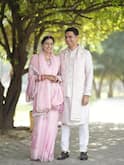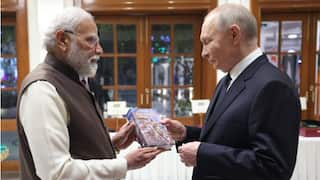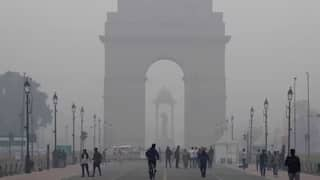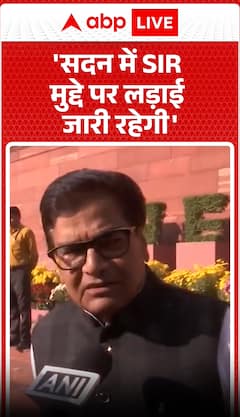Amar Singh Chamkila Movie Review: Diljit Dosanjh, Imtiaz Ali Film A Long Due Homage Chamkila Deserved
Amar Singh Chamkila Movie Review: Film immortalises Punjabi folk funkar forever in cinematic history; a dream, Chamkila would have loved to see materialised in front of his eyes, had he been alive.

Imtiaz Ali
Diljit Dosanjh Parineeti Chopra
Netflix
Amar Singh Chamkila Movie Review: For every Chamkila fan out there and those of many who have heard of his songs like lulabbies since childhood, 'Amar Singh Chamkila', starring Diljit Dosanjh and Parineeti Chopra is just the perfect homage to Punjab's highest record-selling artist. The Imtiaz Ali film immortalises the Punjabi folk funkar forever in cinematic history; a dream, Amar Singh Chamkila would have loved to see materialised in front of his eyes, had he been alive.
Diljit Dosanjh as Amar Singh Chamkila
View this post on Instagram
Amar Singh Chamkila held the tumbi in a particular way, he transitioned from conversation to song seamlessly, sang female and male parts just as well. No matter how many interviews one hears Diljit Dosanjh and Imtiaz Ali talk about the work put in, one has to see Diljit as Chamkila in the movie.
Diljit Dosanjh not just looks the part in many ways, he also sings Chamkila really well. While the texture of their voices is different, there are some moments where you forget that Diljit is only an actor-singer playing Chamkila( especially watch the Ki Ho Gya, Bahan Vich Bhabhi, & Sikhar Dupehre Nahaundi Si sets).
Dosanjh had commendably moulded his voice in ways to sound close to Chamkila. This also brings us to Diljit's co-star Parineeti Chopra.
Parineeti Chopra as Amarjot Kaur
Parineeti plays Amarjot Kaur, Chamkila's singing partner & later his second wife, very well.
It's not just Diljit, Parineeti also emulates Amarjot's body language, presentation and facial expressions in performance very well.
While in some sequences, Parineeti does look a little fazed, but she makes up for that with her performance in 'Bahan Vich Bhabhi', 'Pehli Lalkaar' and 'Mitran Main Khand Ban Gayi'. And, because Amarjot sang at a scale higher than Chamkila, Parineeti looks razor focused on singing it right, and that effort somewhere shows in her performance.
View this post on Instagram
Chamkila Movie Review
'Amar Singh Chamkila' is shot in a docu-feature style. There is a lot of genre mixing in the film especially with music. The Chamkila biopic begins with Chamkila's death scene in Mehsampur in 1988. The scene is coalasced with glimpses from his childhood, and a song that gives a take on his life. Mohit Chauhan takes on the role of a narrator who talks about Chamkila's influences, childhood, 80s insurgency in Punjab, thus setting the tone of the film and the tragedy that awaits the end of it.
From the very first scene in 'Amar Singh Chamkila', one is completely absorbed in the polarising setup of Chamkila's life.
Interstingly, Ali mixes the personal and political very well in the Chamkila biopic but this is oversimplified and over explained many times; a drawback 'Amar Singh Chamkila' could definitely have avoided.
Ali also uses a lot of archival footage, still photography from Chamkila and Amarjot life and animation to show contrasts between the dangerous times Chamkila is singing in and the love he is receiving from his audiences.
Why Amar Singh Chamkila is not your regular biopic masala entertainer
One interesting element in 'Amar Singh Chamkila' is the maker's commentary on the lives of artists: Chamkila & Amarjot. While Imtiaz Ali uses Chamkila's best known and controversial songs as is in the film, he also through music, sheds light on the happenings of Chamkila and Amarjot life ( especially what could have been going on in their psyche) through AR Rahman's songs.
'Ishq Mithaye', 'Tu Kya Jaane' and a farewell ode to Chamkila: 'Vida Karo' in Arijit Singh's voice, are some musical mixes that flow organically with what is being portrayed on screen.
View this post on Instagram
Imtiaz Ali in Amar Singh Chamkila
'Amar Singh Chamkila' may be a Chamkila biopic, but it has Imtiaz Ali's elements stamped all over it. There is a lot of 'Rockstar' residue not just in terms of an interviewer angle, police officer ploy, Kumud Mishra himself, to draw meta refrences, but also in the style of jumping timelines, using animation and slow-motion( some of which do give goosebumps), and the general narrative style.
Politics of Amar Singh Chamkila
However, Ali has not quite made 'Amar Singh Chamkila' a simple film like 'Rockstar', simply because the former represents the biographical details about a real artist's life.
The Chamkila biopic raises questions about caste politics in terms of inter-caste marriage, Chamkila's 'Chamar' caste, extra-marital affairs, vulgarity, obsence language, freedom of expression, sedition, religion, Kharkus, insurgency in Punjab during the 80s and more.
All of this is blended well with songs, a vibrant background score, and the light-hearted performance by Diljit Dosanjh, who bears all of this very simply on his shoulders.
The editor in this regard, also does the job really well. Mixing of different experimention in form( such as split screens, animation, flashbacks, still photography, archival footage) and yet trying to retain the innocence, fervour and passion of singing through Chamkila's life is commendable.
Amar Singh Chamkila problems
'Amar Singh Chamkila' is riddled with conflicting narratives about Amarjot and Chamkila's life. Their stories as portrayed on screen in contrast to what are in circulation, over explanation and repitition of themes like vulgarity in songs and an idealised romanticism when it comes to portrayal of Punjab or its culture in Imtiaz Ali's films will always be a source of contention among many.
The animation that sometimes oversimplies lyrics, or the incidents happening in the backdrop( see the plotting scene against Chamkila) and the constant interference in the narrative along with split screens takes away the gravitas of what is being portrayed on screen. In an attempt to be woke or to cater to younger audiences, Ali scrapes of layers and potent intensity that Dosanjh is so strongly portraying in every scene.
Having said that, the Chamkila biopic raises important questions about freedom of expression, the role of artist and the audience, violence, extremism and so much more.
Interestingly, 'Amar Singh Chamkila' closes with a song sequence from the Punjabi film 'Patola' which was released after Amarjot and Chamkila's death.
In the film, we see several Chamkila fans throng theatres to catch one last glimpse of their favourite artist's performance on screen in 'Patola'.
Perhaps, now it can be said, that many Chamkila fans or even Diljit and Parineeti fans will watch and re-watch 'Amar Singh Chamkila' to recreate memories from the time, or relive a moment in their life when Chamkila breathed ,and provided a moment of entertainment.
Also See: Elvis Of Punjab: The Amar Singh Chamkila Story







































